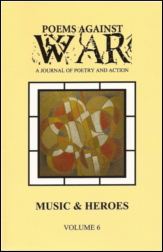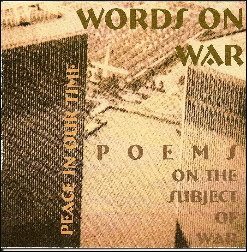Spring 2008
Table of Contents - Vol. IV, No. 1
Poetry Essays Fiction Book Reviews
Poems Against War, Music & Heroes, Volume Six (2007 - 2008), edited by Gregg Mosson, Wasteland Press,
Softcover, ISBN 978-1-60047-115-5, 40 pp., $8.00.
Words on War, Bird House Studios, Inc.,
CD, $15.00.
It is hard not to speak of the Iraq War, Afghanistan, or the 9/11 tragedy without eliciting a strong range of opinions from all those around you, even complete strangers. Out of these politically charged times, two projects of social change were born here in Baltimore: 1) Poems Against War, an annual journal edited by LRR contributor Gregg Mosson, and 2) Words on War, a CD of poems read by their authors issued by Bird House Studios, Inc.
Both projects live within the realm of political poetry, with its long lineage dating back to early last century, and are clearly influenced by the protest poetry of the Vietnam war era. The weakness of political poetry is that it tends to dwell exclusively in the world of rhetoric and dogma, failing to connect to the inner world of the poet, and lacks completeness and resonance. The most successful political poems are able to balance the inner and outer worlds, make the political personal, and the personal political, until the poem is a breathing organism that can be touched, not an abstraction.
Poems Against War offers a wide range of poems that cover the spectrum of political poetry. Volume 6 of the print journal is tastefully laid out and organized around the theme Music & Heroes with wonderful cover art by Minas Konsolas. It features the work of nationally known poet Antler, as well as such Baltimore area poets as Alan Barysh, Grace Cavalieri, Medina Krause, Brian Langston, Gregg Mosson, Charles Rammelkamp, Mary Riley, Kate Powell Shine, and others. The issue contains enough variation in subject matter and individual to keep the reader’s interest from cover to cover. On the rhetorical side of the poetry spectrum are poems like the following from Antler:
Meant Something 300 Years AgoWhen a bomb the size of a poppy seed can blow up a plane,
When a bomb the size of a pumpkin seed can blow up a train,
When a bomb the size of a peanut can blow up a skyscraper,
When a bomb the size of a football can blow up a city,
When a bomb the size of a police car can blow up a State,
When a bomb the size of a skyscraper can blow up the Earth,
Then, when tsunamis of terrorists flood America
coast to coast,
When no second passes without a girl or boy
blowing themselves up
to kill innocent bystanders,
What future for ever-increasing profit margin then
when the very existence of money
is in contempt of court
When a man can by blowing his brains out
kill not only himself
but everyone on Earth
the entire Earth and
the endless Universes
pastpresentfuture
in a nanosecond?
You’re telling me a child sticking out his tongue
to catch a snowflake makes a difference?
You’re telling me a girl turned on by her girlfriend’s
breasts makes a difference?
You’re telling me an eagle feather on a mountaintop
meant something 300 years ago.
You’re telling me God wants everyone
to grow old and die
Because Eve ate the apple
God told the snake
to tell her to eat
And the only way we can live after we die
and be young forever is
if we believe everything his Son
that God sent here to be murdered
said?
On the other end of the spectrum is a poem by Marcus Colasurdo, with no less an agenda, but enough personal details to successfully walk the fine line between inner and outer worlds:
SheehanEventually: the telegram.
And
the mother is alone.
Too often is she alone
in this feral circle of days.
When lights go down
and photographs are not enough,
what sleep awaits her?
Cape on coffin.
Medal made in China.
Sincere regrets.
How would you dream?
Is there a music, man-made
that can justify the burial march
and make it a lullaby
just right
for tonight?
When the town closes down
and the clock repeats itself,
who is left awake to collect
these tears?
Eventually: the mother is alone
And
the fire inside her
burns upon itself—
A night in a gymnasium: scroll rolled proud.
A birthday in a backyard: close camera laughter.
Now the rosary beads are worn down smooth.
A child is what she remembers.
His face is a dream.
Always a child;
come fresh and new into the world—
Hers.
No longer hers.
What power
what posture
what policy
can answer the ache
that bleeds
when the lights go down?
What sad science can reattach
the phantom limb?
How would you dream?
There are many mothers—
as many, I tell you—
as there are soldiers—
and upon this beguiled calendar,
the young have died before the old.
You are my kin:
And if you speak out loud
of the world tonight,
please do it with wisdom—
for there are women alone in the darkness
near you:
whispering
tears
whispering.
Editor Gregg Mosson has assembled an impressive collection of political poetry in this now annual journal, and it is certainly worth checking out.
Words on War is a CD of spoken poetry with musical accompaniment produced by Bird House Studios in Baltimore. The cover shows an aerial photograph of the twin towers of the World Trade Center. While most of the poems focus on the current Iraq War, there are also poems on the Civil War, the Spanish Civil War, the Cold War, WWI and WWII, and the Viet Nam War. Contributors to this project include many prominent Baltimore poets, in addition to frequent LRR contributions such as Alan Reese, Dan Cuddy, Dave Eberhardt, Michael Monroe, S. Thomas Summers, and my fellow LRR editor Chris George.
The tone of the poems ranges from political satire to serious artistic works. A sampling of titles give a feel for the variance in this collection: “Good King George,” “W the Decider,” “Shock and Awe,” “Invoking the Ghost of Charles Faulkenburg,” “In this Corrupt Democratic Country,” “Smart Bombs Intelligent Carnage,” “Burying Stonewall Jackson’s Arm,” “Nightmare for Warmongers,” and “Lock and Load Blues.” Listening repeatedly to the CD, I was impressed at how well the collection held together as a whole just as it emphasized the voices of the individual poets with a tasteful musical accompaniment. My only regret with the CD was that I didn’t have the text of the poems to read as I listened to the voices, but that is probably a limitation of the medium. I was however able to find the text online for one of my favorite poems on the CD. Accompanied by harp to enhance the surreal atmosphere, this poem by David Franks was one of the highlights of the recording:
In kindergarten Alice Gaines
Played the harp . at nap time
& for an hour at noon each day
It was as if Angels sang away
The cares of children sweetly sleeping
The cares of children sweetly sleeping
After graham crackers & milk . even
When the air aids sirens’ shrill alarms
Shattered dreams
Alice Gaines played the harp . even
We . the youngest children knew the drill
To close the windows against flying glass
To move under our desks & clasp
Our hands to the back of our bowed necks & pray
That the bomb was not really on its way
This time . that the Russians weren’t coming
This time . to sift through our charred remains
Alice Gaines played the harp . as
From beneath my desk I prayed:
Dear God . this is David
In Washington D.C. . remind
The Russians . my Father
Pappa . & . Bubbie are Russians . too
Dear God . this is David
I am in
The first reading group
Under my desk
Waiting
For the end
Of the world
I wish I could find more texts for the recorded poems to give a flavor of the breadth of talent and styles captured on this CD. But you’ll have to take my word on it. Words on War is a beautifully produced CD, reminiscent of some of the beat generations’ recordings, and well worth the investment.
© Jim Doss


